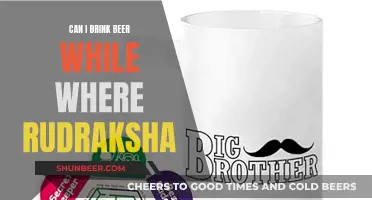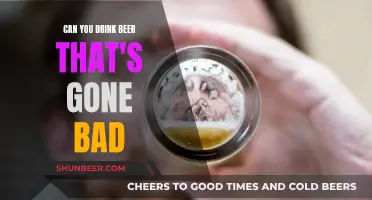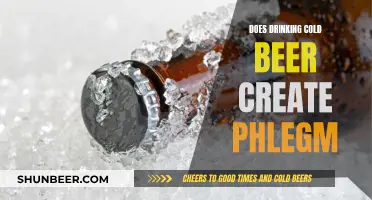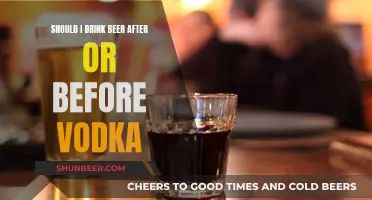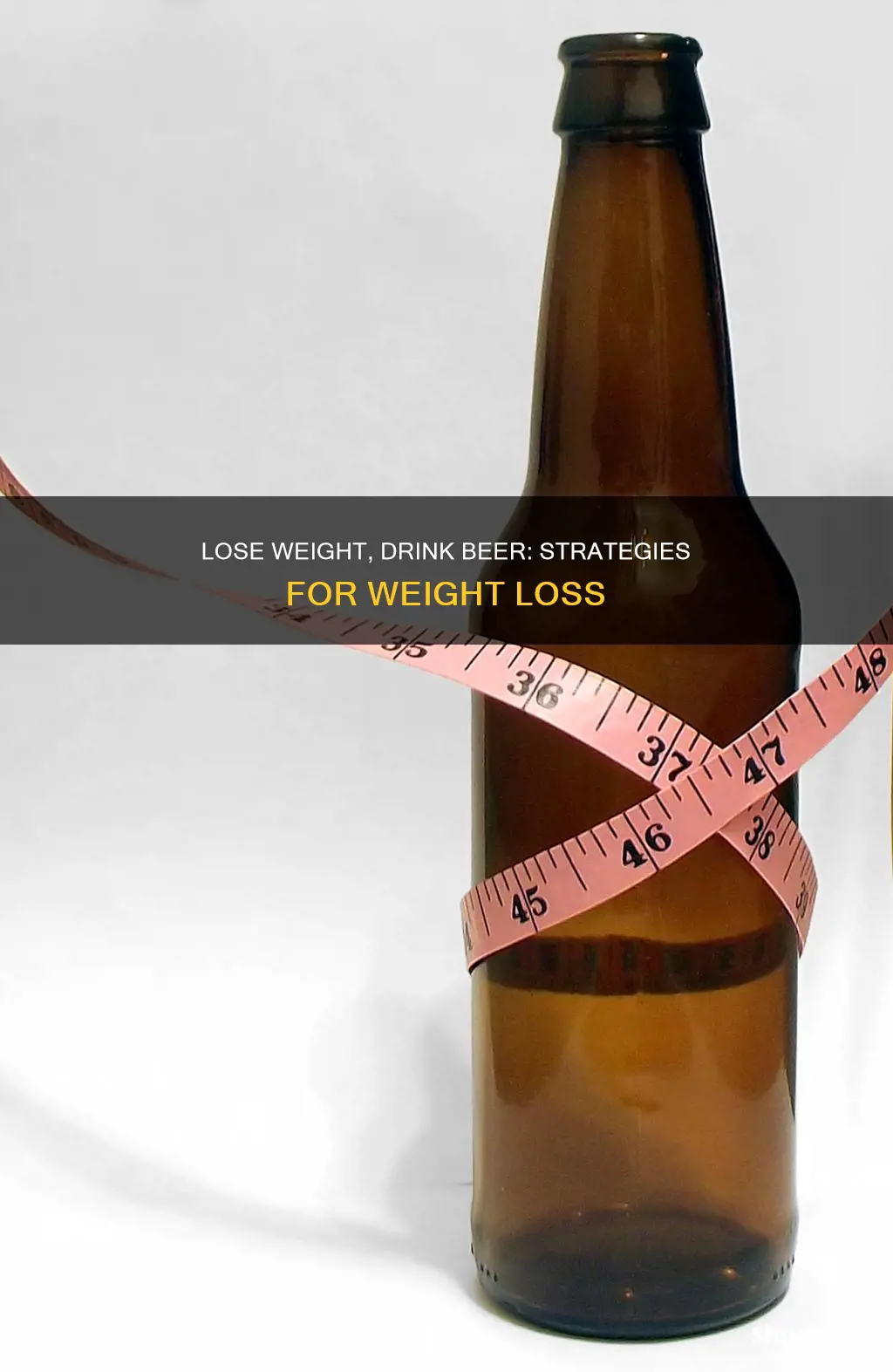
Losing weight while still drinking beer is a challenging task. Beer is often associated with weight gain, particularly in the abdominal area, due to its high calorie content and the way the body metabolises alcohol. However, it is possible to lose weight while still enjoying the occasional beer by making some adjustments to your drinking and eating habits, as well as incorporating exercise into your routine.
One strategy is to limit the number of beers you consume per week. The fewer beers you drink, the fewer empty calories you ingest. You could try setting a clear goal, such as one beer a day or two beers on the weekend. Another approach is to consciously adjust your eating habits when drinking beer. For example, if you're having a burger with a couple of beers, skip the fries or opt for a side salad instead.
In addition to moderating your beer intake and making smarter food choices, increasing your physical activity can also help you lose weight. Aim for at least 30 minutes of moderate-intensity aerobic exercise most days of the week, as well as strength training and stretching. High-intensity intermittent exercise (HIIE) is particularly effective for burning fat and accelerating weight loss.
While it may be challenging, losing 10 lbs while still drinking beer is achievable by combining these strategies and staying consistent with your healthy habits.
| Characteristics | Values |
|---|---|
| Alcohol consumption | High alcohol intake is associated with a high waist circumference. |
| Beer belly | Caused by the high-calorie content in alcohol. |
| Calories | Alcohol contains almost as many calories as pure fat. |
| Weight gain | Alcohol can lead to weight gain throughout the body. |
| Sleep | Alcohol negatively affects sleep quality. |
| Self-control | Alcohol inhibits self-control, leading to poor food choices. |
| Keystone habits | Drinking is a keystone habit that affects other areas of life, such as diet and exercise. |
| Weight loss | Reducing alcohol intake can lead to weight loss. |
| Diet | A healthy diet with reduced calories and portion sizes can aid weight loss. |
| Exercise | High-intensity intermittent exercise can help burn fat and accelerate weight loss. |
What You'll Learn

Drink in moderation
If you're looking to lose 10 lbs and still enjoy a beer, moderation is key. This means drinking within the recommended limits, which, according to the National Institute on Alcohol Abuse and Alcoholism (NIAAA), is up to 14 drinks per week for men and no more than four drinks in a single day. One drink is defined as 12 ounces of beer, 5 ounces of wine, or 1.5 ounces of 80-proof spirits.
Drinking in moderation can help you avoid the negative consequences of excessive alcohol consumption, such as weight gain and its associated health risks. Here are some tips to help you drink beer in moderation while still enjoying your favorite beverage:
- Set a limit: Decide on the number of beers you can have per week. The fewer beers you drink, the fewer empty calories you ingest. Aim for one beer a day or two beers on the weekends.
- Be mindful of your drinking habits: Keep track of how much and how often you're drinking. This awareness can help you stay within your limits.
- Alternate with non-alcoholic drinks: Opt for non-alcoholic or low-alcohol beers, or alternate between alcoholic and non-alcoholic drinks. This will help reduce your overall alcohol and calorie intake.
- Drink water: Drinking water alongside your beer can help slow down your alcohol consumption, keep you hydrated, and make you less likely to reach for another beer.
- Avoid drinking on an empty stomach: Having food in your stomach can slow down the absorption of alcohol. Eat a meal or a healthy snack before drinking, and avoid drinking on an empty stomach.
- Plan your drinks: If you know you'll be drinking, plan your meals and drinks accordingly. Decide what and when you'll eat to avoid making unhealthy choices under the influence.
- Exercise: Engage in regular physical activity to burn off the extra calories from your beer. Aim for at least 30 minutes of moderate-intensity exercise, such as brisk walking or swimming, most days of the week.
- Make healthier food choices: Opt for more nutritious foods like fruits, vegetables, whole grains, and lean proteins. Reduce your intake of processed foods, sugary treats, and high-calorie snacks that often accompany beer.
- Choose lower-calorie options: When drinking beer, opt for lighter or low-calorie options. These can help reduce your overall calorie intake without sacrificing your enjoyment of beer.
- Be mindful of triggers: Identify situations or emotions that trigger your urge to drink. If certain people or places make you want to drink more, consider avoiding them or having a non-alcoholic drink instead.
By following these tips and drinking in moderation, you can work towards losing 10 lbs while still enjoying the occasional beer. Remember, it's all about balance and making conscious choices to support your health and fitness goals.
Beer and Alcohol: Can They Be Mixed?
You may want to see also

Eat a healthy meal before drinking
Eating a healthy meal before drinking alcohol is a great way to curb cravings and control your appetite throughout the night. Here are some tips and food choices to consider:
Protein-Rich Foods
Protein-rich foods such as eggs, salmon, Greek yogurt, and lean meats are excellent choices to include in your pre-drinking meal. Protein is the most satiating macronutrient, keeping you fuller for longer and reducing the risk of alcohol-induced food binges. It also slows down the absorption of alcohol into your bloodstream.
High-Fibre Foods
Fibre-rich foods like oats, bananas, chia seeds, berries, asparagus, grapefruit, sweet potatoes, and avocados are great options. Fibre helps delay stomach emptying, slowing down alcohol absorption and reducing the effects of alcohol on your body. These foods also provide essential vitamins, minerals, and antioxidants, which can help protect your body from alcohol-induced damage.
Healthy Fats
Avocados, olive oil, nuts, and seeds are excellent sources of healthy fats. Fats take longer to digest than protein or carbohydrates, which can help slow the absorption of alcohol. Additionally, these foods provide essential nutrients and help promote overall health. Just be mindful of portion sizes, as healthy fats are calorie-dense.
Complex Carbohydrates
Complex carbs, such as quinoa, sweet potatoes, and whole grains, take longer to break down and can help reduce the effects of alcohol on your body. They provide sustained energy and can help balance blood sugar levels, which may prevent alcohol-induced spikes and crashes.
Hydration
Drinking water before and during alcohol consumption is crucial. Alcohol is dehydrating, and staying hydrated can help counteract this effect. Water can also help you feel fuller, reducing the amount of alcohol and calories you consume. Additionally, proper hydration supports overall health and exercise performance, which is essential for weight loss.
Timing
The timing of your meal is also important. Eating a healthy, well-balanced meal a few hours before drinking can help ensure that your body has time to digest and absorb the nutrients. This will provide a solid foundation to mitigate some of the negative effects of alcohol.
Remember, while these strategies can help, the most effective way to lose weight and maintain a healthy lifestyle is to practise moderation and make long-term healthy choices.
Beer Drinking: A Dangerous Game for Dogs
You may want to see also

Drink water before, during, and after alcohol
Drinking water before, during, and after drinking alcohol is a good strategy for losing weight. Here's why:
Water is a Natural Appetite Suppressant
Water can make you feel full, which reduces your hunger. When your stomach senses that it is full, it sends signals to your brain to stop eating. Drinking a glass of water before reaching for a beer can help curb unnecessary drinking and snacking. A 2014 study found that participants who drank 500ml of water before meals experienced a reduction in body weight, body fat, and body mass index (BMI). They also reported feeling less hungry.
Water Increases Calorie Burning
Some research indicates that drinking water can help burn calories. A 2014 study found that participants who drank 500ml of cold water experienced an increase in energy expenditure, burning 2-3% more calories than usual in the 90 minutes after drinking the water. Drinking cold water may further enhance these benefits because the body expends energy to heat up the water for digestion.
Water Helps Remove Waste from the Body
Water helps the body remove waste efficiently. When the body is dehydrated, it cannot correctly remove waste as urine or feces. Water helps the kidneys filter toxins and waste while retaining essential nutrients and electrolytes. Dehydration can also lead to constipation and hard or lumpy stools. Water keeps waste moving by softening or loosening hardened stools.
Water Reduces Overall Liquid Calorie Intake
Drinking water instead of alcoholic beverages or sugary drinks reduces your overall calorie intake. Replacing even a few high-calorie drinks each day with water can have long-term weight loss benefits. A 2015 study found that female participants who drank 250ml of water after lunch each day while attending a 24-week weight loss program lost more weight than those who drank the same volume of diet beverages.
Water is Necessary for Burning Fat
Water is essential for burning off fat from food and stored fat in the body. The process of metabolizing fat is called lipolysis, which requires water molecules to interact with triglycerides (fats) to create glycerol and fatty acids. A 2016 mini-review found that increased water intake led to increased lipolysis and fat loss in animal studies.
Drinking water before, during, and after drinking alcohol can be a helpful strategy for losing weight. It can help curb your appetite, increase calorie burning, improve waste removal, reduce overall calorie intake, and support fat burning. However, it is important to note that drinking water alone may not lead to significant weight loss, and a comprehensive weight loss plan may be needed for more substantial results.
Beer Belly, Swollen Feet: Understanding the Unlikely Connection
You may want to see also

Exercise regularly
Exercise is a key factor in most weight loss efforts. The more you exercise, the more calories you burn, and the more weight you will lose. Here are some tips to help you exercise regularly and effectively:
- Try high-intensity interval training (HIIT): This type of training involves short bursts of intense activity, such as sprinting or other exercises, followed by brief periods of rest. A study in the Journal of Obesity suggests that HIIT is more effective at burning fat and accelerating weight loss than many other forms of exercise.
- Exercise regularly: Aim for at least 30 minutes of moderate-intensity aerobic exercise most days of the week. This can include activities such as running, cycling, swimming, or playing sports.
- Incorporate strength training and stretching: In addition to aerobic exercise, it's important to include strength training and stretching in your workout routine. Aim for at least two days per week of strength training and stretching, preferably in the morning and evening.
- Make lifestyle choices that burn calories: Simple changes in your daily routine can help you burn more calories. For example, take the stairs instead of the elevator, or take frequent breaks at work to take short walks.
- Combine exercise with a healthy diet: For effective weight loss, it's important to combine regular exercise with a healthy diet. Focus on eating more vegetables, fruits, whole grains, and lean proteins, while reducing your intake of processed foods, added sugars, enriched flour, and saturated fats.
- Stay consistent: Consistency is key when it comes to exercising for weight loss. Make sure to stick to your workout routine and healthy habits to see results.
By incorporating these tips into your lifestyle, you can effectively exercise to lose weight while still enjoying the occasional beer. Remember to always consult with a healthcare professional before starting any new diet or exercise program.
Beer and Keto: What You Need to Know
You may want to see also

Avoid high-calorie mixers
Cocktails and mixed drinks are often loaded with calories due to the mixers used, which can contain high amounts of sugar and calories. For example, a single chocolate martini has more calories than a McDonald's grilled chicken sandwich. A standard 1.5-ounce serving of 80-proof alcohol has 96 calories, but when you add mixers, the calorie count can more than double.
To avoid consuming excessive calories from mixers, here are some strategies you can use:
- Choose low-calorie mixers: Opt for low-calorie mixers such as diet soda, club soda, sparkling water, or diet tonic. These mixers have little to no calories and can significantly reduce the overall calorie count of your drink.
- Skip the mixer altogether: Instead of using a mixer, try ordering your spirit of choice on the rocks. Infused vodkas, for example, offer a variety of flavors without adding extra calories.
- Dilute your drink: Another option is to dilute your drink with club soda or sparkling water. For example, you can mix vodka with club soda and a splash of cranberry juice, garnished with a citrus wedge. This will give you the flavor you want without the extra calories.
- Choose wine, light beer, or simple cocktails: Wines, light beers, and simple cocktails made with low-calorie mixers tend to be lower in calories. A glass of white wine (180 mL) typically contains around 148 calories, while a light beer (12 oz) can range from 95 to 136 calories.
- Make your drinks at home: By making your drinks at home, you can control the ingredients and avoid premade mixers, which are often high in sugar and calories. You can experiment with fresh herbs, low-calorie or unsweetened mixers, and adjust the ratio of ingredients to create flavorful drinks with fewer calories.
- Be mindful of portion size: The average serving size of wine and alcoholic beverages is often smaller than you think. Cocktail parties or dinners can be tricky, as glasses are often refilled before they are empty, making it challenging to track your alcohol and calorie consumption.
- Alternate alcoholic and non-alcoholic drinks: This strategy helps reduce your overall calorie intake and keeps you hydrated. Starting your evening with a glass of water can also help satisfy your thirst so you don't rely on alcoholic beverages to do so.
- Have a game plan: Before heading out, decide on the number of drinks you will consume and cut back on calories earlier in the day. Eating a light snack beforehand can also help prevent you from getting too tipsy and making unhealthy food choices.
By following these tips, you can continue to enjoy your drinks while reducing your calorie intake and working towards your weight loss goals.
Drinking Beer at Dollywood: What You Need to Know
You may want to see also
Frequently asked questions
Limit the number of beers you have per week. The fewer beers you drink, the fewer empty calories you are ingesting. It is also important to adjust your eating habits based on your drinking habits.
A beer belly is clinically referred to as "abdominal obesity". It is often associated with reduced testosterone levels, which is, in turn, associated with an accumulation of excess weight in the abdominal area.
Beer, or any alcoholic drink, can negatively impact your sleep. Alcohol is a sedative and can suppress dreaming. When it's metabolised, your brain wakes up, causing fragmented sleep and nightmares.
Try drinking a glass of water before drinking beer. This will help you feel full and reduce the amount of beer you consume. You can also try non-alcoholic beers or wines, which have fewer calories.


